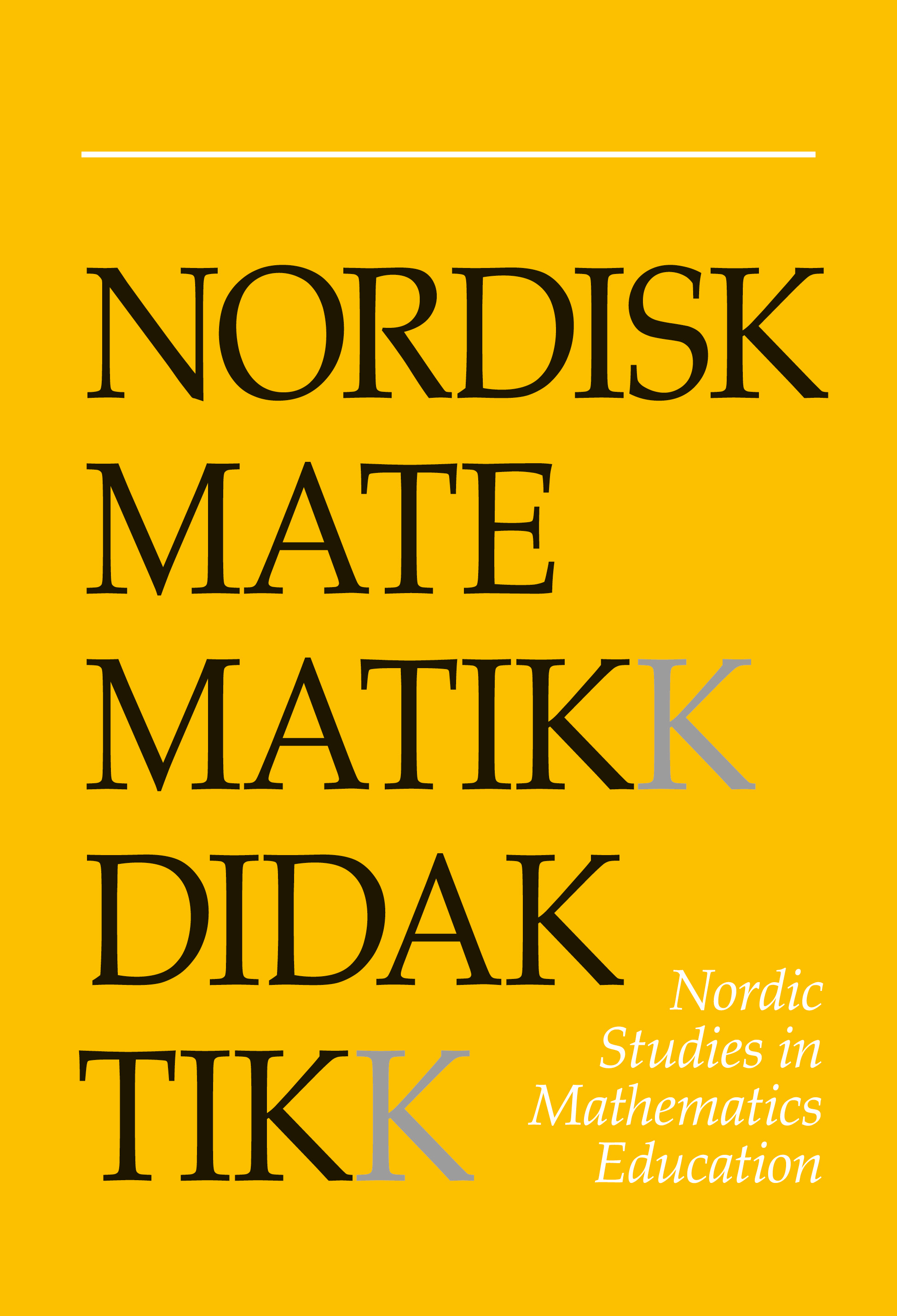Gérard Vergnaud in action
DOI:
https://doi.org/10.7146/nomad.v27i1.149185Abstract
We have contemplated what we could add to the description of the legacy of Gérard Vergnaud, and have realized that we have at least one expe- rience that is probably not shared by many researchers in mathematics education ...
References
Gomes, A. S. & Vergnaud, G. (2004). On the learning of geometric concepts using dynamic geometry software. RENOTE-Revista Novas Tecnologias Na Educação, 2 (1). https://doi.org/10.22456/1679-1916.13755
Mulligan, J. & Vergnaud, G. (2006). Research on children's early mathematical development: towards integrated perspectives. In A. Gutiérrez & P. Boero (Eds.), Handbook of research on the psychology of mathematics education (pp. 117-146). Brill Sense. https://doi.org/10.1163/9789087901127_006
Vergnaud, G. (1978). The acquisition of arithmetical concepts. In E. Cohors- Fresenborg & I. Wachsmuth (Eds.), Proceedings of PME 2 (pp. 344-355). Universität Osnabrück.
Vergnaud, G. (1979). The acquisition of arithmetical concepts. Educational Studies in Mathematics, 10 (2), 263-274. https://doi.org/10.1007/BF00230990
Vergnaud, G. (1982a). A classification of cognitive tasks and operations of thought involved in addition and subtraction problems. In T. P. Carpenter, J. M. Moser & T. A. Romberg (Eds.), Addition and subtraction: a cognitive perspective (pp. 39-59). Lawrence Erlbaum. https://doi.org/10.4324/9781003046585-4
Vergnaud, G. (1982b). Cognitive and developmental psychology and research in mathematics education: some theoretical and methodological issues. For the Learning of Mathematics, 3 (2), 31-41.
Vergnaud, G. (1983). Multiplicative structures. In R. A. Lesh & M. Landau (Eds.), Acquisition of mathematics concepts and processes. London Academic Press.
Vergnaud, G. (1984). Didactics as a content-oriented approach to research on the learning of physics, mathematics and natural language. Paper presented at the annual meeting of AERA, New Orleans.
Vergnaud, G. (1988). Multiplicative structures. In J. Hiebert & M. Behr (Eds.), Number concepts and operations in the middle grades (pp. 141-161). NCTM.
Vergnaud, G. (1992). Conceptual fields, problem solving and intelligent computer tools. In E. De Corte, M. C. Linn, H. Mandl & L. Verschaffel (Eds.), Computer-based learning environments and problem solving (pp. 287- 308). Springer. https://doi.org/10.1007/978-3-642-77228-3_14
Vergnaud, G. (1994). Multiplicative conceptual field: What and why? In G. Harel & J. Confrey (Eds.), The development of multiplicative reasoning in the learning of mathematics (pp. 41-59). State university of New York press.
Vergnaud, G. (1996). Some of Piaget's fundamental ideas concerning didactics. Prospects, 26 (1), 183-194. https://doi.org/10.1007/BF02195617
Vergnaud, G. (1997). The nature of mathematical concepts. In P. Bryant & T. Nunes (Eds.), Learning and teaching mathematics: an international perspective (pp. 5-28). Psychology Press.
Vergnaud, G. (1998a). Towards a cognitive theory of practice. In A. Sierpinska & J. Kilpatrick (Eds.), Mathematics education as a research domain: a search for identity (pp. 227-240). Springer. https://doi.org/10.1007/978-94-011-5190-0_14
Vergnaud, G. (1998b). A comprehensive theory of representation for mathematics education. The Journal of Mathematical Behavior, 17 (2), 167- 181. https://doi.org/10.1016/S0364-0213(99)80057-3
Vergnaud, G. (2009). The theory of conceptual fields. Human Development, 52 (2), 83-94. https://doi.org/10.1159/000202727
Vergnaud, G. (2012). Commentary 1. Educational Studies in Mathematics, 79 (3), 439-445. https://doi.org/10.1007/s10649-012-9382-1
Downloads
Published
How to Cite
Issue
Section
License

This work is licensed under a Creative Commons Attribution-NonCommercial-ShareAlike 4.0 International License.



